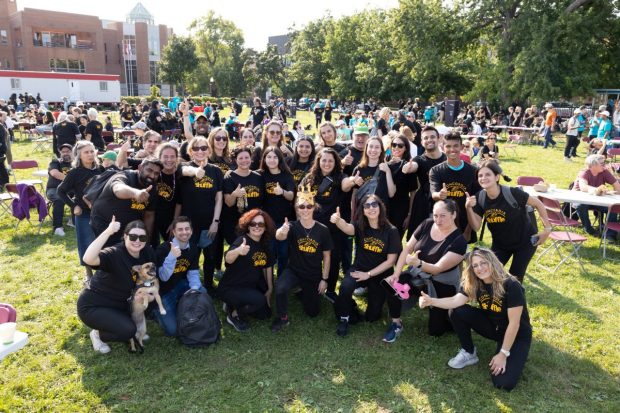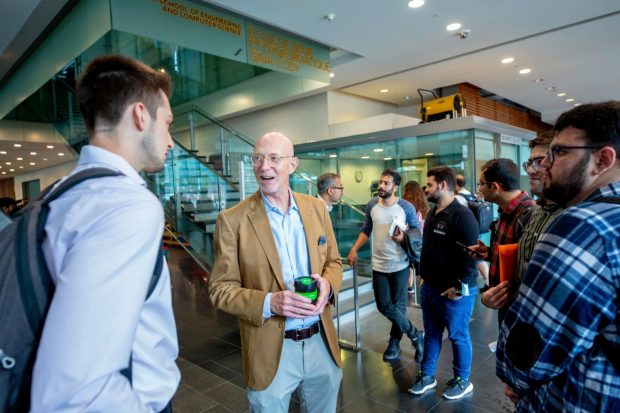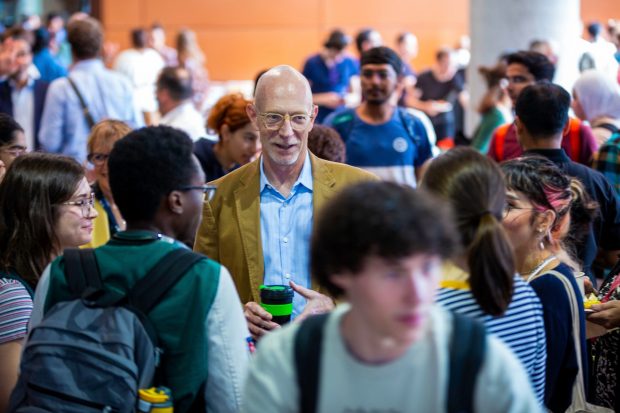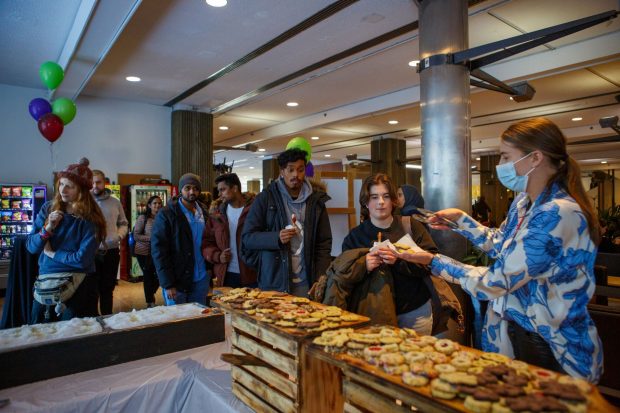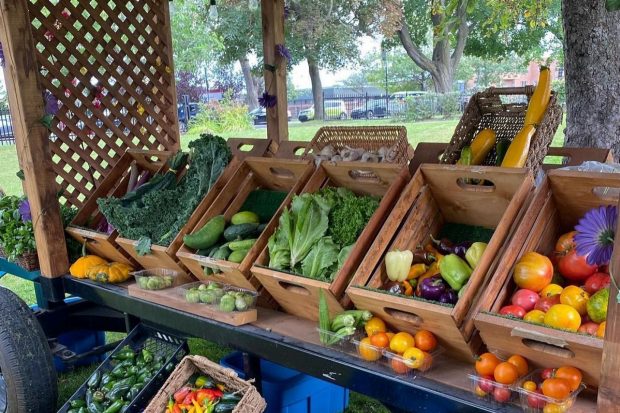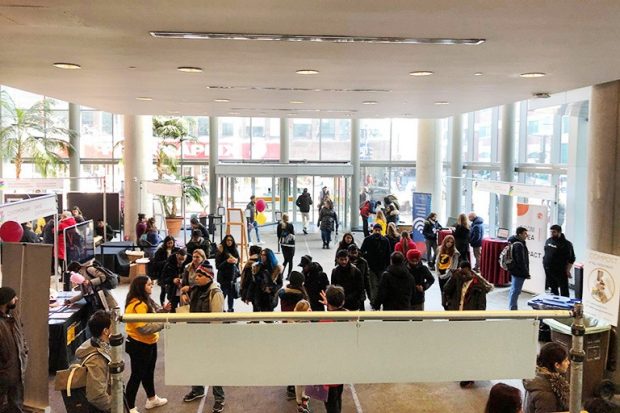Sustainable Event Guide & certification
The Sustainable Event Guide and Certification is intended to help all Concordians host more socially and environmentally sustainable events.
About the guide
The Sustainable Event Guide is meant to help all Concordians host more socially and environmentally sustainable events. It was developed by the Office of Sustainability and Hospitality Concordia in collaboration with the Access Centre for Students with Disabilities, the Black Perspectives Office, the Office of Community Engagement, the Equity Office, the Office of Indigenous Directions, and Zero Waste Concordia in Facilities Management. We would also like to thank the Concordia Student Union, the Sustainability Action Fund, and Sustainable Concordia for their valuable contributions.
This guide aims to address aspects of sustainability related to in-person, virtual, and hybrid events. As such, not all sections will be applicable to all events.
The Sustainable Event Guide includes best practices related to:
a. If you have an event planning committee, deliberately integrate underrepresented communities
b. Include and adequately compensate voices of underrepresented communities in your event’s content
c. Promote your event using diverse channels
d. Establish a code of conduct and clarify channels for participants to report violations
e. Encourage speakers and participants to optionally share their pronouns when introducing themselves, and use non-binary language when possible
f. Provide options for childcare
a. If you have an event planning committee, deliberately integrate Indigenous perspectives
b. If your event features content or perspectives related to Indigenous peoples, ensure that you consult with and invite the appropriate voices and provide appropriate compensation
c. Familiarize yourself with the land acknowledgement available from Indigenous Directions and practice pronunciation beforehand
a. Follow basic best practices for universal accessibility (e.g. option to participate via microphone or text chat, automatic closed captioning enabled, event recording announced, anonymous submission of comments or questions, and online platform tutorial link for virtual events; accessible venue, directions and accessibility-related amenities, clear signage or event greeters for in-person events)
b. Enable accessibility accommodations for those who request it (e.g. note-takers, advance copies of audiovisual materials, live captioning services, sign language interpretation services, personal attendant, sighted guide)
c. Ensure web pages, documents, presentation materials, and promotional material follow accessibility guidelines
d. Make your event financially accessible by offering it for free or enabling reduced pricing
e. Hold your event at an accessible time for your audience
f. Encourage your facilitator, moderator, or event host to use accessible and anti-oppressive facilitation styles
g. If offering an all-day or multi-day event, include adequate breaks and wellness activities in your program
h. After your event is over, make event materials accessible
i. Collect feedback after the event and record lessons learned
a. Use sustainable options for event materials
b. Use reusable dishware over disposable
c. Reduce single-use packaging and select eco-responsible packaging options
d. Provide sorting bins for waste management and request waste sorting volunteers
e. Donate leftover food
f. If your event includes off-campus participants, encourage participants to take sustainable modes of transportation to your event
g. If non-local speakers are invited, have them participate virtually
h. If your event has international participation, host it virtually
a. Choose sponsors, suppliers, and caterers that fulfill at least two of the following criteria: (1) local; (2) operate as a social economy enterprise or are committed to social sustainability; and / or (3) committed to environmental sustainability
b. Purchase from at least one supplier AND / OR catering business owned by underrepresented communities
c. Give non-physical gifts, prizes, and giveaways or, if necessary, choose products that are environmentally and / or socially responsible and which attendees can opt out of
d. Offer an equal number or more plant-based (vegan) dishes than meat options and no dishes that include beef
e. Prioritize and correctly label local, sustainable, and culturally inclusive food and
beverage
a. Invite your participants to reduce their streaming quality and turn off their cameras when not presenting or interacting with others
b. Select a video platform with a low carbon impact
b. If you are emailing participants, in the signature portion of your email include a reminder to delete emails that are no longer necessary
c. When sending documents and videos to participants, rely on your event platform or use cloud-based sharing
a. Communicate the sustainability measures that are being taken for the event and
suggest the actions that participants, speakers, and presenters can take to reduce their
impact
b. If your in-person event has over 100 participants, or your virtual event spans multiple days or has 500 participants, calculate the GHG emissions associated with organizing and hosting the event
Why seek certification
The Sustainable Event Certification is a voluntary and free service available to all members of Concordia who wish to take measurable action in making their events more sustainable.
Event organizers get support in selecting and implementing positive actions. Once certified, they can communicate their achievements to raise awareness and gain recognition of their efforts.
To calculate an event’s score, we compare the number of planned actions with those potentially applicable and calculate a percentage.
Benefits to certifying your event:
- Learn more about sustainable best practices
- Get dedicated support to implement your efforts
- Reduce negative impacts and increase positive benefits of events
- Help Concordia advance on our goals toward the Sustainability Action Plan, the Indigenous Directions Action Plan, the Equity Action Plan, and more
- Highlight your efforts and raise awareness--including through the loan of standing banners celebrating your level of certification!
- Attract sustainability-minded speakers, participants and sponsors
- Be recognized for your leadership!
How to get certified
Step 1: In the planning stages of your event, read the Sustainable Event Guide and consider the actions and timeline in relation to your event.
Step 2: Appoint a lead person on your planning team to coordinate the certification process.
Step 3: At least 4 weeks in advance of your event, email sustainable.events@concordia.ca to book a meeting with the sustainable events team (and include your Hospitality Concordia Events Coordinator if you have one). The bigger the event, the more in advance we recommend that you reach out. A 1.5-hour meeting will guide you through the process of identifying actions that are applicable to your event, provide you with a Sustainable Event Certification checklist and help answer your questions.
Step 4: Submit your completed checklist to the Office of Sustainability. Your preliminary score will be calculated along with your level of certification: Bronze, Silver, Gold or Platinum. You will receive the corresponding seal to include in your promotional materials, and can request to borrow one of our standing banners to use at your event.
Step 5: Undertake and promote the sustainable actions to which you committed.
Step 6: Report back and submit the relevant documents to the Office of Sustainability. You can do this up to three weeks after your event. Be sure to include a photo or screenshot from your virtual event. Your final certification level and performance will be confirmed and you’ll be celebrated on the web page and in promotional materials.
Certified events
Platinum certified sustainable events
Gold certified sustainable events
Silver certified sustainable events
Contact
For questions about the Sustainable Event Guide and Certification, contact
sustainable.events@concordia.ca




















